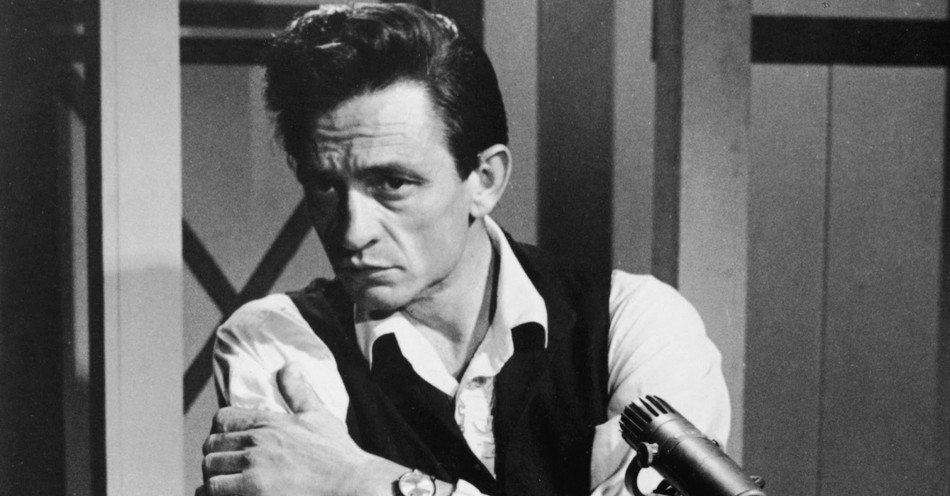Friends down the street were big Johnny Cash fans. My first introduction to this iconic musical artist was in these neighbors’ living room in second grade, listening to “I’d Walk the Line” and “San Quentin” on a large 1960s console stereo. “He was a bad man,” the mother said. “But now he’s a Christian.”
This simplistic, two-sided view of Johnny Cash has some merit to it. He was a musical genius burdened by the demons of his youth. After a midlife spiritual conversion (or maybe a return to his childhood faith), he eventually found love and faith. Most of Cash’s music echoes the themes of his troubled soul searching for redemption. Yet, Cash was a wildly popular entertainer who began his concerts by simply introducing himself: “Hello, I’m Johnny Cash.”
What kept this surprising, often contradictory man going?
Important Events in the Life of Johnny Cash
Johnny Cash was born on February 26, 1932, into a family of Arkansas sharecroppers during the Great Depression. His upbringing taught him reverence for family, the earth, and God’s truth, which informed his long and successful musical career and personal victories.
After serving four years in the United States Air Force, where he sang and played the guitar, he moved to Memphis, Tennessee, in the mid-1950s. He rose to fame in the rockabilly scene, an early predecessor to rock and roll.
Cash met his first wife, Vivian Liberto Distin, at a roller-skating rink in 1951 while he was based at Brooks Air Force Base. He left for West Germany three weeks after meeting Vivian. The couple exchanged hundreds of letters over the next three years. A month after Cash returned from his Air Force service, he and Vivian Liberto Distin were married in San Antonio, Texas. They had four daughters: Rosanne, Kathy, Cindy, and Tara. The couple divorced in 1966 after twelve years of marriage.
Cash’s second wife, June Carter, was part of the Carter Family of musicians. She and Johnny were married to other people when they met professionally and fell in love at the Grand Ole Opry in 1956. They married in 1968 and are considered one of music history’s greatest love stories. They made music together in their 35-year marriage and had one son, John Carter Cash.
Cash died on September 12, 2003, when he was 71 years old. He passed away four months after his beloved wife.
They died several years before the biopic Walk the Line debuted in theaters in November 2005. The couple had signed off on James Mangold’s film, which was in the early stages of pre-production before their deaths.
How Did Christianity Influence Johnny Cash’s Life and Music?
When Cash was interviewed, he refused to identify with any particular denomination. Interviewers sometimes asked him if he was Baptist or Catholic. “No,” he would say, “I’m a Christian.”
Cash had a deep faith in God and His power to redeem lost souls. His parents raised him as a Southern Baptist, and he remained a devout Christian his whole life. However, an addiction to alcohol and painkillers, and a reckless lifestyle during his younger years plagued him. Perhaps Cash was self-medicating to deal with personal demons: he had a difficult childhood involving an abusive father and guilt over his brother’s death in 1944.
In 1971, when Cash was about 40, he answered an altar call at Evangel Temple, an Assemblies of God congregation holding an outreach to Nashville’s music people. After this, Cash spoke openly about his faith. He believed his chaotic life up to that point, and future sobriety were part of God’s plan. And he saw Christ’s gospels as books written for outcasts needing redemption and grace.
Cash actively spread the gospel of Jesus after his altar call. In the 1970s, he appeared at evangelist Billy Graham’s crusades, where Cash openly credited God for his life, love, and success. Cash and June Carter Cash also appeared in several Billy Graham Crusade television specials. In addition to being part of the crusades, Cash and Billy Graham produced a film in 1973 about the life of Jesus, Gospel Road: A Story of Jesus, which Cash co-wrote and narrated.
10 Things You Didn’t Know about Johnny Cash
1. Known as “the man in black,” Cash explained he wore dark clothing because it was easier to maintain on tour than a variety of lighter-colored clothing. He once added that he wore all black on behalf of the poor, the hungry, and “the prisoner who has long paid for his crime.” He said, “ I don’t see much reason to change my position... The old are still neglected, the poor are still poor, the young are still dying before their time, and we’re not making many moves to make things right. There’s still plenty of darkness to carry off.”
2. Cash performed concerts in prisons. His first live album, Johnny Cash at Folsom Prison, was released on May 6, 1968. A Concert: Behind Prison Walls, Johnny’s fifty-fourth album, was recorded at the Tennessee State Prison in 1974. Altogether, Cash recorded four albums of live performances for prison inmates.
3. He felt very guilty about the death of his 14-year-old brother, Jack. Cash did not convince his older brother to go fishing with him rather than work that day, and Jack died in an accident with a saw. Cash once said, “It was awful at the time and it’s still a big, cold, sad place in my heart and soul.”
4. Cash won an impressive 18 Grammy Awards and released over 50 studio albums. The Grammy Awards include, but are not limited to, “Best Male Country Vocal Performance,” and “Best Country Album.”
5. He was friendly with every United States president during his career. At Cash’s first White House performance, he did not play two songs Nixon requested: “Okie from Muskogee,” about disliking hippies, and “Welfare Cadillac,” mocking welfare recipients. Instead, Cash sang “The Ballad of Ira Hayes,” about a Native American Marine who helped raise the flag at Iwo Jima, and Cash’s original composition, “What Is Truth,” with lyrics criticizing the Vietnam War.
6. Mistakenly believing he had some Cherokee ancestry, Cash advocated against the “harsh and unfair” treatment of Native Americans in America. Bitter Tears: Ballads of the American Indian, released in 1964, focuses on the history of injustice Native Americans suffered at the hands of European settlers and citizens of the United States.
7. Cash is one of the best-selling musical artists of all time, with sales of more than 90 million records worldwide. His music crossed the musical boundaries of country, rock and roll, rockabilly, blues, folk, and gospel.
8. Cash made five trips to Israel in his lifetime. He went on a spiritual pilgrimage in 1966 and a trip with June Carter in 1968, which inspired their album, The Holy Land. The couple also filmed Gospel Road in Israel. The film includes scenes of Cash singing from the top of Mount Arbel and touring the Sea of Galilee and the Jordan River.
9. Cash’s switch to a drug-free, purpose-filled life inspired him to write a novel about the life of New Testament apostle and writer Paul, titled Man in White. Paul, like Johnny Cash, was an unlikely candidate for leadership in the Christian church. Johnny was a popular musical performer with a troubled personal life. Paul was originally Saul, a well-off, educated, potential rabbi and a Roman citizen who violently persecuted Christians. Both men made dramatic turnarounds by the grace of God.
10. Cash was inducted into the Country Music Hall of Fame, the Rock and Roll Hall of Fame, and the Gospel Music Hall of Fame, a rare achievement. He also received a Kennedy Center Honor for lifetime achievement.
10 Quotes about Life and Faith by Johnny Cash
Always good for a sound bite, here are some of the things Cash famously said:
1. “I love songs about horses, railroads, land, judgment day, family, hard times, whiskey, courtship, marriage, adultery, separation, murder, war, prison, rambling, damnation, home, salvation, death, pride, humor, piety, rebellion, patriotism, larceny, determination, tragedy, rowdiness, heartbreak, and love. And Mother. And God.” — The Man in Song: A Discographic Biography of Johnny Cash by John M. Alexander
2. “The times when I was so down and out of it were also the times when I felt the presence of God… I felt that presence, that positive power, saying, ‘I’m still here.’’ — Ring of Fire: The Johnny Cash Reader by Michael Streissguth
3. “Telling others is part of our faith alright, but the way we live it speaks louder than we can say it.” — The Man Comes Around: The Spiritual Journey of Johnny Cash by Dave Urbanski
4. “Sometimes I am two people. Johnny is the nice one. Cash causes all the trouble. They fight.” — Johnny Cash: Redemption of an American Icon by Greg Laurie
5 “He [Cash’s brother Jack] was a very devout Christian who studied his Bible every day. He was a very wise person. He gave me advice on a lot of things. We were very close. When he died I felt a really great loss, but his memory has always been an inspiration to me.” — The Man Called Cash: The Life, Love, and Faith of an American Icon by Steve Turner
6. “Success is having to worry about every damn thing in the world, except money.” — Johnny Cash: Fighting for the Underdog by Edward Willett
7. “There’s no way around grief and loss: you can doge all you want, but sooner or later you just have to go into it, through it, and, hopefully come out the other side. The world you find there will never be the same as the world you left.” — Johnny Cash: The Autobiography
8. “They’re powerful, those songs. At times they’ve been my only way back, the only door out of the dark, bad places the black dog calls home.” — Johnny Cash: The Autobiography
9. “Children, you can choose love or hate. I choose love.” — Trains, Jesus and Murder: The Gospel According to Johnny Cash by Richard Beck
10. “The gospel of Christ must always be an open door with a welcome sign for all.” — The Man Comes Around: The Spiritual Journey of Johnny Cash by Dave Urbanski
Great Songs by Johnny Cash
Some of his signature songs include “Folsom Prison Blues,” “Man in Black,” “Get Rhythm,” “Ring of Fire,” and “I Walk the Line.”
He recorded the song “Hurt” six months before he died. Hearing Cash’s soulful cover of “Hurt” inspired its songwriter, Trent Reznor of the band Nine-Inch Nails, to say, “It wasn’t my song anymore.” Its haunting lyrics and Cash’s weathered voice make it a classic. “Hurt” is Cash’s last look back at his life before leaving this earth and moving on in spirit. Images of Jesus on the cross, places in Cash’s younger life, and June Carter appear in the music video for “Hurt,” recorded in Hiltons, Virginia, in 2003.
To read more Christianity.com articles on musicians with faith, read:
What Should You Know about Christian Singer Jon Foreman?
Why Should Christian Music Pay Attention to T Bone Burnett?
What You Should Know about Rich Mullins
Mark Heard: Contemporary Christian Music's Best Songwriter
Why Did Christian Music Forget The Call's Michael Been?
Remembering Contemporary Christian Music Pioneer Keith Green
Photo Credit: Getty Images/Hulton Archives

This article is part of our People of Christianity catalog that features the stories, meaning, and significance of well-known people from the Bible and history. Here are some of the most popular articles for knowing important figures in Christianity:
How Did the Apostle Paul Die?
Who are the Nicolaitans in Revelation?
Who Was Deborah in the Bible?
Who Was Moses in the Bible?
King Solomon's Story in the Bible
Who Was Lot's Wife in the Bible?
Who Was Jezebel in the Bible?
Who Was the Prodigal Son?



